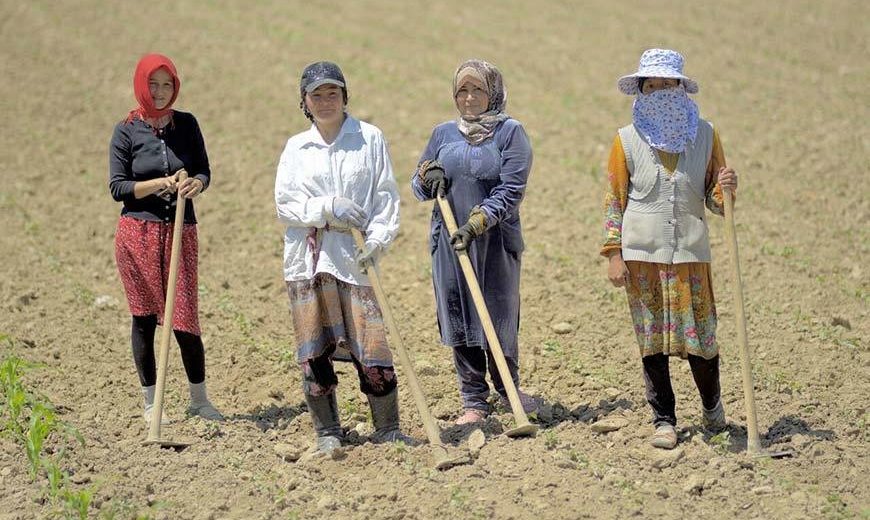Check out our report on Fairtrade's contribution to the SDGs
17 Sep 2019
10 ways Fairtrade helps advance the Sustainable Development Goals
The world gathers in New York this week for the UN General Assembly to review progress towards global sustainability targets. Here are ten ways Fairtrade contributes to the Sustainable Development Goals (SDGs).
by Kelly Hawrylyshyn, Senior Advisor Global Resource Mobilization, Fairtrade International

Image © Didier Gentilhomme
- The Fairtrade Minimum Price is a safety net for 1.7 million farmers and workers in more than 75 countries, protecting them from volatile markets and ensuring they can better cover their cost of sustainable production to achieve Goal 1: end poverty in all its forms everywhere. Coffee farmers hit by the current global price crash are among those benefitting.
- The Fairtrade Access Fund has disbursed more than US$128 million to date benefitting 252,000 smallholder farmers in 18 countries, contributing to Goal 2: end hunger, achieve food security and improved nutrition and promote sustainable agriculture. Fairtrade also provides technical support for smallholders – such as the Zawadi women coffee farmers – to add value to their commodities.
- Fairtrade’s standards contribute to Goal 5: gender equality and the empowerment of women and girls by prohibiting gender discrimination, sexual harassment and gender based violence, as well as promoting entitlements for parental leave, pregnant and breastfeeding women. Fairtrade also runs gender leadership schools and facilitates seed funding for women’s initiatives through the Fairtrade Premium.
- In line with Goal 8: decent work for all, the Fairtrade Hired Labour Standard ensures more than 200,000 workers making our tea, flowers, footballs and textiles enjoy better working conditions. They benefit from better terms of employment covering working hours and overtime, contracts and temporary work, together with core workers’ rights such as collective bargaining and freedom of association. The standard also ensures they benefit from the use of protective clothing, safe handling of hazardous materials, building safety, grievance procedures and child care.
- The Fairtrade Standards help Goal 10: reduce inequalities by prohibiting discrimination and promoting equality. Women, youth and migrant workers in rural communities are better equipped and more confident to take part in decision making in their cooperatives and plantations. They are also protected from gender based violence and other forms of discrimination in recruitment, training and promotion, and they gain from technical support and upskilling to secure decent incomes. Among those to gain better treatment are Haitian migrant banana workers in the Dominican Republic.
- Fairtrade is the only ethical standard working on both ends of the supply chain towards Goal 12: sustainable consumption and production patterns. At one end, producer organisations are supported to comply with Fairtrade environmental and social standards (including no GMO and no child or forced labour). At the other end, traders and buyers are also held accountable through the Fairtrade Trader Standard which covers transparent contracts, fair prices, openness about sourcing and market prospects, pre-financing for producers and compliance with labour and environmental law.
- Fairtrade is taking action on Goal 13: combat climate change and its impacts on farmers and workers, who are on the frontline of climate risks. Fairtrade promotes climate resilient agriculture through its standards and programmes to protect the environment and biodiversity. More and more farmers are harvesting rain water, planting shade trees, switching to biogas and renewable energy sources, and investing in integrated pest management, organic fertilisers and dynamic agroforestry. The Fairtrade Climate Standard is the first of its kind to address imbalances in the carbon market and ensure a fair financial return for the producers.
- Fairtrade embeds Goal 16: building effective, accountable and inclusive institutions in its own internal governance and accountability. It is the only global ethical label 50 percent owned and run by farmers and workers themselves. Fairtrade cooperatives, which must abide by the Fairtrade standard requirements of being democratic, transparent and inclusive, can negotiate better deals with traders and access credit, insurance and other financial services. They decide for themselves how to spend the Fairtrade Premium, whether improving productivity or addressing their community’s sustainable development priorities.
- Fairtrade brings together more than 1.7 million farmers and workers, 1600 producer organisations, and countless trade unions, consumers and campaigners from all over the world to realise Goal 17: global partnerships for sustainable development. More than 2,100 towns, cities, schools, universities and faith based organisations promote the Fairtrade principles. Fairtrade partners with more than 4000 businesses to deliver real impact for farmers and workers, and works with governments to bring about fairer trading practices – essential for sustainable economic growth. That’s why governments support Fairtrade’s approach.
- The Fairtrade Premium enables rural communities to invest and advance other Global Goals. Since the SDGs were launched in 2015, more than €500 million of Fairtrade Premium has funded schools, healthcare and clean drinking water, among other things (Goal 3: good Health and Well Being, Goal 4: quality education and Goal 6: clean water and sanitation). Learn more about these and other amazing examples of Fairtrade Premium projects here.